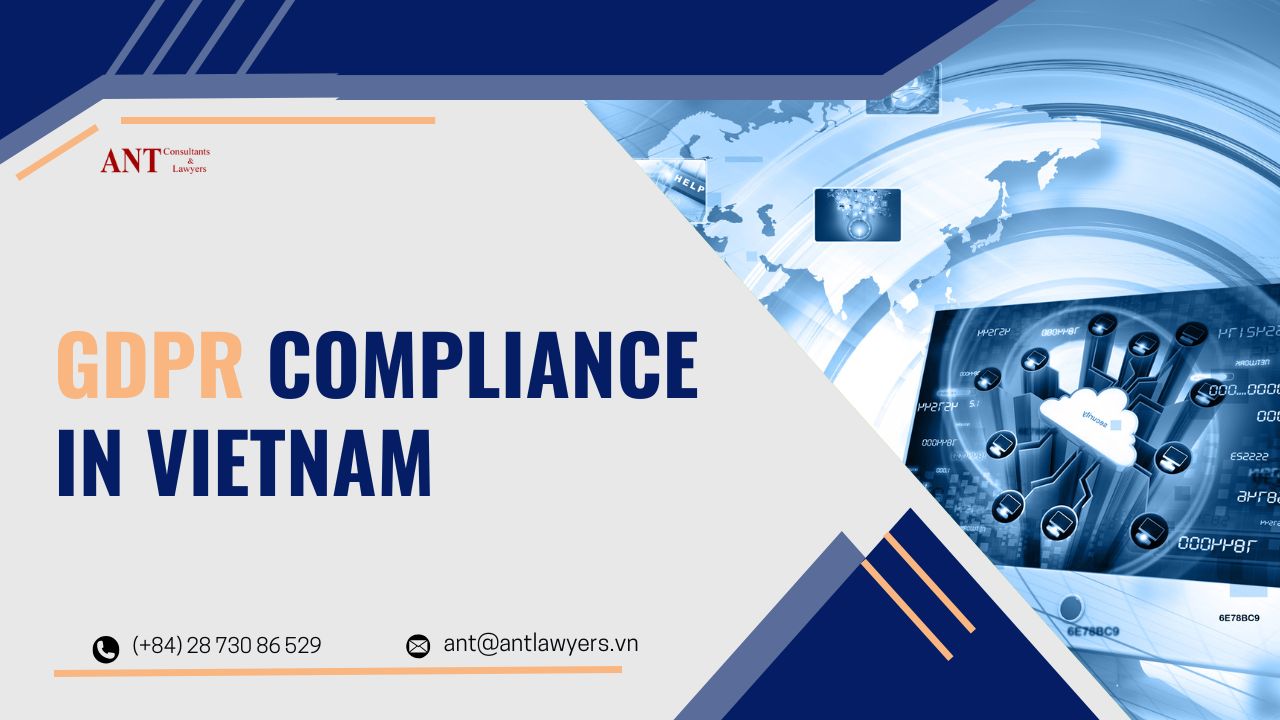Achieving Strong GDPR Compliance in Vietnam: 6 Step Guide for Foreign IT Companies


As Vietnam continues to emerge as a global IT outsourcing hub, European and international companies increasingly seek partnerships with Vietnamese service providers. The country’s competitive advantages—cost efficiency, high-quality talent, and a strong digital infrastructure—make it a top destination for IT outsourcing. However, with this growth comes the challenge of ensuring GDPR compliance in Vietnam.
With the General Data Protection Regulation (GDPR) in effect since 2018, companies that process EU citizens’ personal data must adhere to stringent privacy and security standards. This regulation affects both European businesses operating in Vietnam and Vietnamese IT firms providing outsourcing services to European clients. Failure to comply can lead to substantial financial penalties and reputational damage.
In here, we suggest 6 step guide to GDPR compliance in Vietnam, helping foreign companies navigate the regulatory landscape, implement effective data protection measures, and build trust with their global clients.
Understanding GDPR and Its Relevance to Vietnam
The GDPR is a European Union regulation designed to protect personal data and privacy. It applies not only to EU-based companies but also to non-EU businesses that process EU citizens’ data. This means that any Vietnamese IT company handling data for European clients must comply with GDPR to avoid penalties and business risks.
Key Principles of GDPR:
- Lawfulness, Fairness, and Transparency – Data processing must be legal and clear to the individuals whose data is collected.
- Purpose Limitation – Data should only be used for specified, legitimate purposes.
- Data Minimization – Only necessary data should be collected.
- Accuracy – Data must be accurate and kept up to date.
- Storage Limitation – Personal data should not be kept longer than necessary.
- Integrity and Confidentiality – Data must be protected from breaches and unauthorized access.
- Accountability – Companies must demonstrate compliance with GDPR.
Why Does GDPR Compliance in Vietnam Matter?
- For European Companies Expanding to Vietnam: Any EU company setting up operations in Vietnam must ensure their local teams adhere to GDPR when handling European customer data.
- For Vietnamese IT Service Providers: Many Vietnamese firms process and store European client data, making compliance essential for securing international contracts.
Failure to meet GDPR standards can result in fines based on significant amount or global annual revenue. Beyond financial losses, non-compliance can damage business relationships and hinder market expansion.
Legal Landscape: GDPR vs. Vietnam’s Data Protection Laws
Vietnam has been actively developing its data protection laws to align with international standards. While not identical to GDPR, these regulations provide a legal foundation for data security and privacy.
Vietnamese Data Protection Laws and Their GDPR Implications
- Cybersecurity Law: Requires companies handling Vietnamese users’ data to store it within Vietnam, similar to GDPR’s data sovereignty requirements.
- Personal Data Protection Decree (PDPD): Defines personal data and imposes obligations on businesses regarding data collection, processing, and storage.
- E-Transactions Law: Strengthens regulations on electronic contracts and online transactions, impacting IT service providers.
Despite these legal frameworks, Vietnam’s data protection laws do not fully meet GDPR standards, making it crucial for foreign businesses to implement additional GDPR-compliant measures when operating in Vietnam.
Key Steps to Ensure GDPR Compliance in Vietnam
Foreign companies operating in Vietnam and Vietnamese IT providers working with EU clients must take proactive steps to achieve GDPR compliance in Vietnam.
Step 1: Conduct a GDPR Readiness Assessment
- Identify Personal Data Flow: Map how personal data is collected, stored, and transferred.
- Assess Risks: Identify gaps in compliance and security vulnerabilities.
- Engage Legal Experts: Consult with GDPR specialists to ensure alignment with European regulations.
Step 2: Appoint a Data Protection Officer (DPO)
For companies handling large volumes of EU customer data, appointing a Data Protection Officer (DPO) is a GDPR requirement. The DPO should oversee compliance efforts and liaise with EU regulators when necessary.
Step 3: Implement Data Processing Agreements (DPAs)
When outsourcing IT services, European companies must sign DPAs with Vietnamese service providers to ensure GDPR-compliant data handling. These agreements should cover:
- Data collection and storage policies
- Security measures to prevent breaches
- Compliance monitoring and reporting requirements
Step 4: Strengthen Data Security Measures
- Encryption: Protect sensitive data using strong encryption methods.
- Access Controls: Restrict access to personal data only to authorized personnel.
- Regular Audits: Conduct routine security assessments to detect and mitigate risks.
Step 5: Ensure Lawful Data Transfers
GDPR restricts data transfers outside the EU unless certain safeguards are in place. Foreign companies and Vietnamese IT providers must use one of the following mechanisms:
- Standard Contractual Clauses (SCCs): EU-approved legal contracts ensuring data protection.
- Binding Corporate Rules (BCRs): Internal data protection policies for multinational corporations.
- Adequacy Decision: Countries with GDPR-equivalent laws can freely receive EU data (Vietnam is not currently on this list).
Step 6: Implement Data Subject Rights
Under GDPR, individuals have the right to:
- Access their data
- Request corrections
- Be forgotten (data deletion)
- Object to processing
- Request data portability
Vietnamese IT firms handling EU customer data must implement GDPR compliance in Vietnam processes to fulfill these rights efficiently.
Challenges and Common Pitfalls in GDPR Compliance in Vietnam
Challenge 1: Understanding the Complexity of GDPR
Vietnamese businesses may struggle with GDPR’s intricate legal and technical requirements, necessitating training and expert guidance.
Challenge 2: Data Localization vs. Cross-Border Transfers
Vietnam’s Cybersecurity Law requires local data storage, while GDPR mandates strict control over cross-border data transfers, creating potential conflicts for foreign companies.
Challenge 3: Third-Party Risks
If a Vietnamese IT firm subcontracts services, GDPR liability extends to all subcontractors. Companies must ensure all third parties meet GDPR standards.
Challenge 4: Cost of Compliance
Implementing GDPR measures—such as hiring a DPO, conducting audits, and upgrading security—can be costly, particularly for small and medium-sized enterprises (SMEs).
The Competitive Advantage of GDPR Compliance in Vietnam
Why GDPR Compliance in Vietnam is a Business Growth Strategy
- Increases Trust: European clients prefer working with GDPR-compliant partners.
- Expands Market Access: Compliance opens doors to international contracts.
- Reduces Legal Risks: Avoids heavy fines and legal disputes.
- Enhances Cybersecurity: Strengthens defenses against data breaches.
Companies that invest in GDPR compliance in Vietnam not only meet legal requirements but also gain a competitive edge in the global IT outsourcing market.
Future Outlook for GDPR Compliance in Vietnam
As Vietnam’s IT sector continues to grow, so does the importance of GDPR compliance in Vietnam. While the country’s legal framework is evolving, foreign companies and Vietnamese service providers must take proactive steps to ensure compliance with EU data protection laws.
By implementing GDPR best practices, businesses can build trust, secure international partnerships, and position themselves as leaders in secure and ethical data handling. In the long run, embracing GDPR compliance in Vietnam is not just a regulatory necessity but a strategic advantage for sustainable business growth.
For companies looking to expand their IT operations in Vietnam, now is the time to invest in GDPR compliance—ensuring both legal security and business success in the global digital economy.
About ANT Lawyers, a Law Firm in Vietnam
We help clients overcome cultural barriers and achieve their strategic and financial outcomes, while ensuring the best interest rate protection, risk mitigation and regulatory compliance. ANT lawyers has lawyers in Ho Chi Minh city, Hanoi, and Danang, and will help customers in doing business in Vietnam.
How ANT Lawyers Could Help Your Business?
You could reach ANT Lawyers in Vietnam for advice via email ant@antlawyers.vn or call our office at (+84) 24 730 86 529
Recent Posts
7 Bold Reasons Why Tokenization in Vietnam Could Transform Your Future
Change is coming. Quietly. Digitally. Rapidly. Let’s imagine the situation, which assets are no longer…
Vietnam P2P Lending: 5 Bold Reasons Why Decree 94/2025 Could Empower Millions or Backfire?
A New Financial Chapter Begins in Vietnam One person lends. Another borrows. It’s that simple.…
5 Essential Lessons from Risk Management in Digital Assets in Vietnam: Protecting Trust in a Digital World
Trust Is the Real Currency Money can be lost. Tokens can vanish. Platforms can crash.…
5 Powerful Reasons Why Vietnam Digital Asset Sandbox Is a Bold and Hopeful Move for Innovation
Change is fast. Rules are slow. But innovation can’t wait. As digital assets grow, so…
4 Critical Steps to Effectively Terminate The Employment Contracts with Confidence and Compassion
To terminate the employment contracts can be a complex and often sensitive process, especially when…
8 Insights from a Due Diligence Attorneys in Vietnam for Successful M&A Deals
Navigating the complex landscape of mergers and acquisitions (M&A) in Vietnam can be a daunting…





